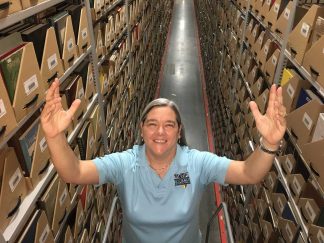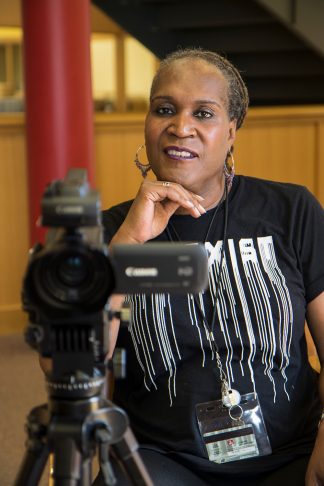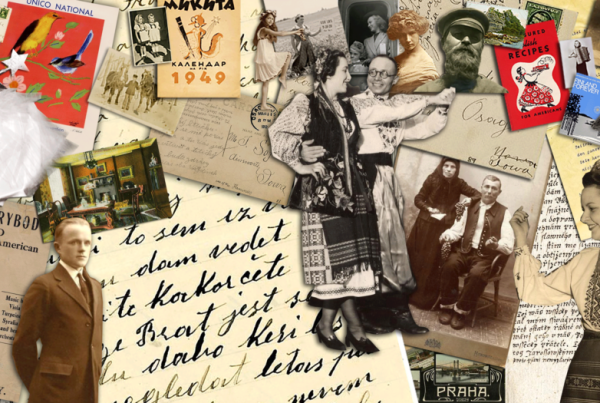By Allison Campbell-Jensen
The Tretter Transgender Oral History Project has received Tawani Foundation support to continue the collection of oral histories in the transgender/gender queer community over the next three years.
Curator Lisa Vecoli says that Phase III was designed to continue using a trained oral historian but also add community volunteers as interviewers. Friends, partners, and community members will be able to check out equipment from Tretter to interview transgender and nonbinary storytellers.
The focus of these conversations is “completely out of our control,” Vecoli says. But with close relationships as the foundation of the recorded conversations, she hopes to see and hear more comfort and more intimacy in the interviews. This is the model used successfully by StoryCorps, the New York Trans Oral History Project, and other collections.
With some training (if desired) and the loans of equipment to interviewers from the transgender community, Vecoli is enthusiastic about the expected outcomes of these conversations.
“We will allow the transgender community to tell their own stories.”
The stories so far
Vecoli initiated the Transgender Oral History Project some eight years ago because she recognized a gap: While transgender and gender queer topics were hot, she found very little documentation.
“There were a dozen publishers (of vintage periodicals), rather than hundreds for the gay male community,” Vecoli says. “We needed a new way to document the transgender experience and oral histories provided the best strategy.”
Vecoli knew to be successful the project needed to be by the community, for the community. With initial funding from Tawani Foundation, she hired Andrea Jenkins as the first oral historian. Jenkins, a transgender artist, poet, and author (who is now President of the Minneapolis City Council), brought instant credibility to the project.
“Andrea’s leadership of the project made all the difference in Phase I. She gave the project visibility and credibility that were crucial.”
“It was a privilege, a deep honor,” Jenkins says, “that my community in the broadest sense of all transgender and non-binary people had the faith and the confidence in me to share their intimate stories.”
Along with providing real-life stories of people seeking and finding their identities, the initial foray into transgender oral history also had the intent to create empathy among viewers with these “amazing courageous stories,” she says. “I think that’s why it’s so important for this work to continue,” she adds.
These oral histories have resonated with people, says K. J. Rawson, Northeastern University Professor and Director of the Digital Transgender Archive. “The Tretter Collection Transgender Oral History Project is a ground-breaking initiative that offers critical support for trans people to tell their own stories and value their own history.”
Phase Two of the project, which launched in 2019, was headed by Mryl Beam, Ph.D., and focused on political activism and community organizing, broadened the geographic scope of the oral histories across the country, and also resulted in a podcast.
“Many of the interviews from the first two phases have been highly popular on the Digital Transgender Archive and we have found that researchers are routinely seeking access to these deeply moving interviews,” Rawson adds. “In this next phase, the Tretter Transgender Oral History Project will become even more interactive and dynamic, which will only further extend the impact of this world-making project.”
Phase Three begins some months from now — but an essential aspect has been acquired because the project has funding.
Commitment from the funder
“The Tretter Collection Transgender Oral History Project is a ground-breaking initiative that offers critical support for trans people to tell their own stories and value their own history.”
— K. J. Rawson, Northeastern University Professor and Director of the Digital Transgender Archive
In its third phase, the Tretter Transgender Oral History will be funded again by Tawani Foundation, which was founded by Colonel (IL) Jennifer N. Pritzker, IL ARNG (Ret.), Founder, Pritzker Military Museum & Library.
In the 2014 article announcing the partnership, Pritzker said: “I am very glad to be a partner and contributor to a prestigious institution like the University of Minnesota that has done so much in so many diverse areas to spread enlightenment and education.”
The result of Tawani Foundation’s generous contributions and the work of Tretter curators and oral historians is a rich compendium, available online, of the personal stories of a large number of diverse transgender people. Phases I and II combined have over 260 oral histories. These individuals’ stories are varied and passionate, eye-opening and uplifting, as well as expressing love and connection.
Why collect oral histories
According to Vecoli, oral histories fill in a gap in the historical record that the archive has no other way to document. The traditional strategies of archiving publications, organizational records and personal papers are just too limited in the transgender community.
Historically, we need peoples’ stories, from their perspectives, Vecoli says. They are history as lived experiences that can be difficult to record in other ways.
Vecoli says: “We are, as far as I know, the largest project like this in the world.” And by allowing the people living their ordinary lives, outside the limelight, to record their thoughts, feelings, and opinions, the University Libraries and the Tretter Collection offer a seldom-seen lens on a community developing in front of our eyes.
“And today,” Vecoli continues, “we need to document the impact of attacks on the transgender/gender queer community, the impact of that and how people are organizing to fight back. This is a crucial time for LGBTQ rights and this project will help document what happens over the next three years.”
Of this next phase of the project, Jenkins says: “I am really supportive of a community-based project that really allows grassroots storytelling and activism.”





